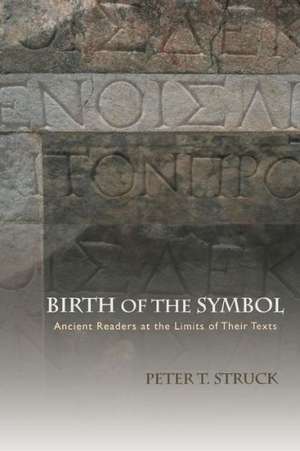Birth of the Symbol – Ancient Readers at the Limits of Their Texts
Autor Peter Strucken Limba Engleză Paperback – 8 iul 2014
The book notes that Aristotle and his followers did not discuss the use of poetic symbolism. Rather, a different group of Greek thinkers--the allegorists--were the first to develop the notion. Struck extensively revisits the work of the great allegorists, which has been underappreciated. He links their interest in symbolism to the importance of divination and magic in ancient times, and he demonstrates how important symbolism became when they thought about religion and philosophy. They see the whole of great poetic language as deeply figurative, he writes, with the potential always, even in the most mundane details, to be freighted with hidden messages.
Birth of the Symbol offers a new understanding of the role of poetry in the life of ideas in ancient Greece. Moreover, it demonstrates a connection between the way we understand poetry and the way it was understood by important thinkers in ancient times.
| Toate formatele și edițiile | Preț | Express |
|---|---|---|
| Paperback (1) | 224.71 lei 6-8 săpt. | |
| Princeton University Press – 8 iul 2014 | 224.71 lei 6-8 săpt. | |
| Hardback (1) | 524.60 lei 6-8 săpt. | |
| Princeton University Press – 24 mai 2004 | 524.60 lei 6-8 săpt. |
Preț: 224.71 lei
Nou
Puncte Express: 337
Preț estimativ în valută:
43.01€ • 46.74$ • 36.15£
43.01€ • 46.74$ • 36.15£
Carte tipărită la comandă
Livrare economică 21 aprilie-05 mai
Preluare comenzi: 021 569.72.76
Specificații
ISBN-13: 9780691162263
ISBN-10: 0691162263
Pagini: 312
Dimensiuni: 157 x 232 x 20 mm
Greutate: 0.51 kg
Editura: Princeton University Press
ISBN-10: 0691162263
Pagini: 312
Dimensiuni: 157 x 232 x 20 mm
Greutate: 0.51 kg
Editura: Princeton University Press
Notă biografică
Peter T. Struck is Assistant Professor of Classics at the University of Pennsylvania. He was a fellow at the National Humanities Center.
